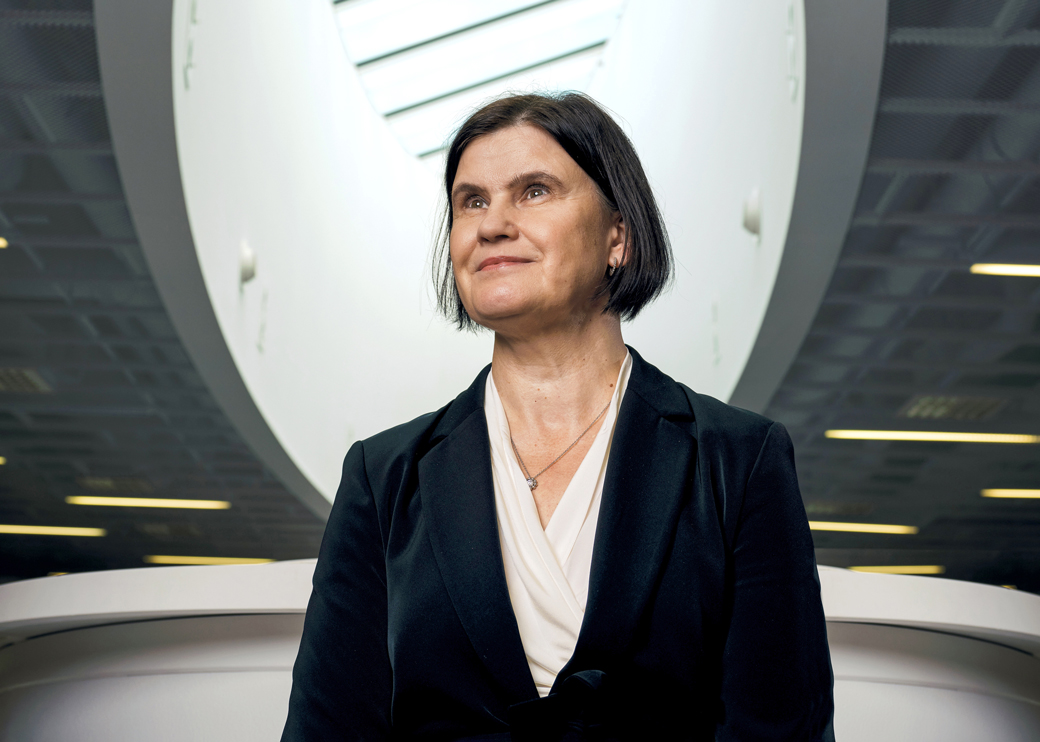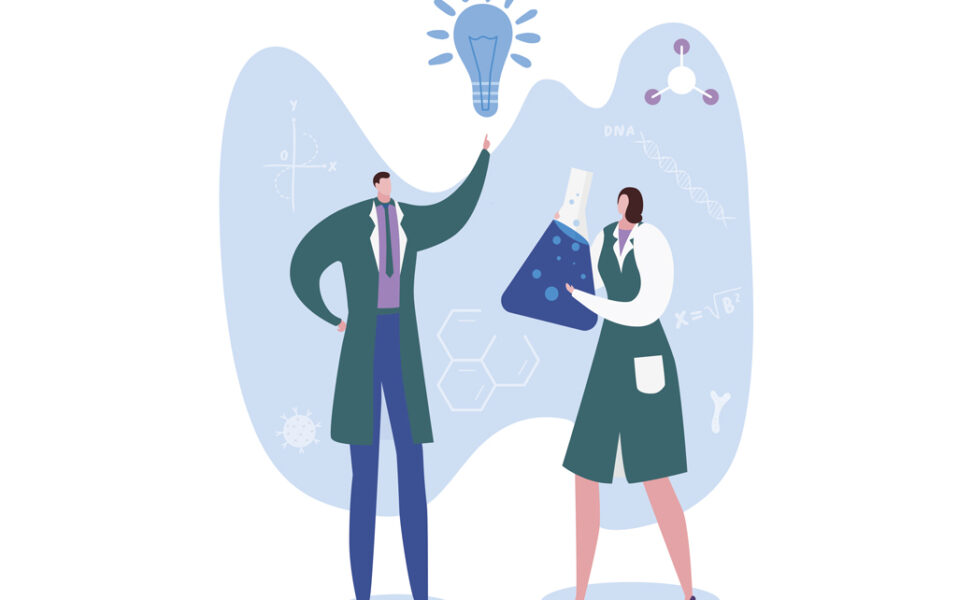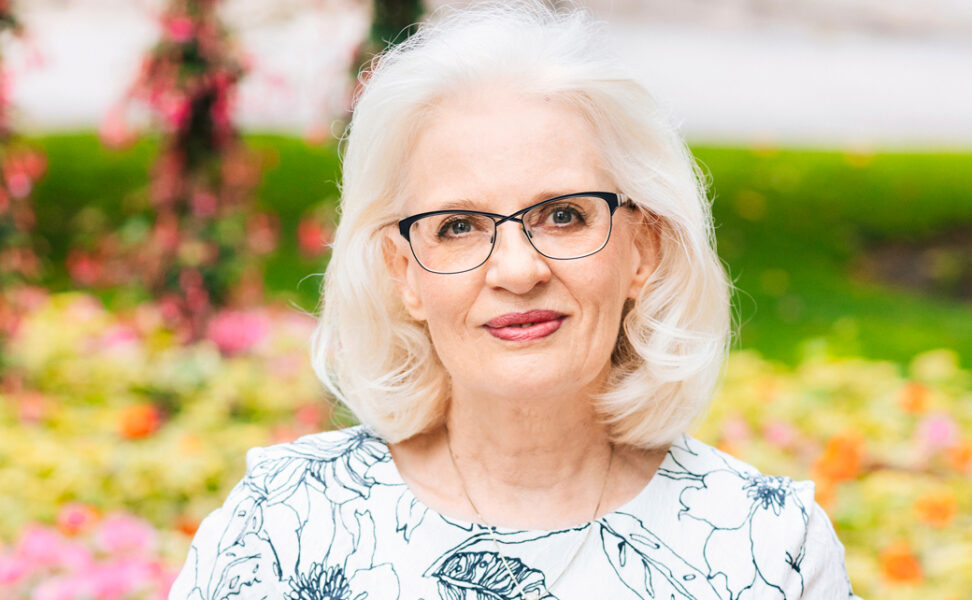
Libraries riding the wave
We must quickly develop services to ensure research data is preserved even in the future, envisions Minna Niemi-Grundström.
Text pi mäkilä Images samuli skantsi Translation Marko saajanaho
When your field of work happens to be the largest multidisciplinary university library in the country, the University Librarian gets to experience all of the development first-hand.
“That makes this hugely interesting. The University Librarian must be well acquainted with the latest teaching and research practices, opportunities provided by technology, the development of scientific publishing, and the effects of legislation and policies on activities”, says Minna Niemi-Grundström, University Librarian at the Helsinki University Library. She took up her new position in August.
The Helsinki University Library employs approximately 140 professionals and operates on four campuses as well as online. The library is one of the university’s nine independent units. As University Librarian, Niemi-Grundström’s responsibilities include library operations and finances, planning and development, and staff management.

“I have truly enjoyed coming here. The job closely matches my expectations of the kind of job I want to do. I am interested in learning new things, and this job gives you so many opportunities to develop your skills and knowledge. As University Librarian, you can deepen your customer-oriented service activities and management skills in a changing environment.”
She notes that service development is very much a team effort, based not only on understanding customer needs but also diverse knowledge.
Strong attraction to the library world
The library sector has been very familiar to the new University Librarian since her student days. In the past, she chose Library and Information Science as her minor. She also worked part-time in the Loimaa city library in her hometown, for example. There was a strong attraction to the field.
“I quickly noticed what a multifaceted field this was. For example, it has been very interesting to observe how the digital shift has progressed in libraries.”
Multiculturalism as a teacher
In addition to the library sector, Niemi-Grundström found herself interested in other development work. She spent approximately ten years in positions such as Head of Development and Head of Information Management, Quality Management and Operations at Nokia.
However, library work and research eventually drew her in. Since then, she has worked as the Library Director of Tampere University of Technology and Library Director of the University of Tampere, and as a part-time project manager at the University of Turku Library.
Before taking up the position at the University of Helsinki, Niemi-Grundström worked as a special researcher at the Faculty of Information Technology and Communication at the University of Tampere.
“To be honest, all of my work experience has brought me towards my current job.”
“To be honest, all of my work experience has brought me towards my current job. At Nokia, I learned a lot about working in a multicultural community and how to build the future. I have learned that change is not an end in itself.”
Promoting open science
Niemi-Grundström believes the role of the library will become increasingly customer-oriented in the future. That requires predictive development of services and keeping up with the times.
“The scientific library will continue to play an important role in society. Digital development has revolutionised scientific library operations in many ways. The library has been a significant provider of digital materials. The overwhelming majority of newly acquired materials are in a digital format.”
“The library has a significant role as a provider of open science, such as open publishing and research data management services.“
Digitalisation has diversified the library’s customer service and education and research provisions. In addition, artificial intelligence is increasingly utilised in the design of library processes and services. Currently, new kinds of space solutions required by digital services are also under development.
“The library has a significant role as a provider of open science, such as open publishing and research data management services. It is also a key player in promoting the visibility and accessibility of publications produced at the university. To develop these services, we also have active co-operation ongoing with our international partners.”
In a changing information environment
University libraries tend to ride the crest of the digitalisation wave.
“A large portion of the material we get is digital, but that does not remove the need for printed collections. We have still got plenty of disciplines with essential sources and research data in the form of printed materials.”
Niemi-Grundström believes the role of the library will require more of a balancing act between different services and needs in the future.
“Digital services will become more important. We need new services to ensure that, for example, any data created via research is preserved even in the future.”
Science and research do not follow any organisational lines, so the library must actively engage in co-operation both within the university and with external partners. The library closely supports the core processes of research, education, and learning.
“The objective is to move towards practices that promote openness in scientific publishing”, she says.
The library provides support and education to the customers in a changing information environment
Niemi-Grundström notes that a customer-oriented approach is vital to library services.
“We strive to improve our customer insight with data-based analytics as well as active co-operation with our customers.”
She expects the library facilities, collections, and customer service to stay in demand.
“The services are less localised. The library provides support and education to the customers in a changing information environment. The expansion of the library’s service role also creates need for new kinds of expertise. The rising costs of data materials is a big challenge, and hopefully solutions can be found through open science practices.”
Thus far, the move to open publishing has not brought on any changes despite the costs now focusing on publishing fees rather than subscription charges. Libraries may play a significant role as an enabler of change.
Towards the future without fear
Niemi-Grundström tells us she particularly enjoys developing something new.
“I like having a lot of irons in the fire. This job is not short on challenges either. One of them has to do with taking care of the resources needed to advance development.”
The library’s main role as a provider of reliable information has not changed over the years. On the other hand, the library has developed services for new kinds of needs throughout its existence.
Niemi-Grundström believes the field may change, even radically.
“It will be interesting to see how the move to open publishing goes, for example, and how that affects material acquisition and development of collections, as well as the services provided.”
“It will be interesting to see how the move to open publishing goes, for example, and how that affects material acquisition and development of collections, as well as the services provided.”
Whichever direction the field ends up heading towards, the new University Librarian is not afraid of the transition. She describes herself as future-oriented.
“I try to find a positive outlook and always move forward when developing myself. This attitude definitely helps me do my job.”

